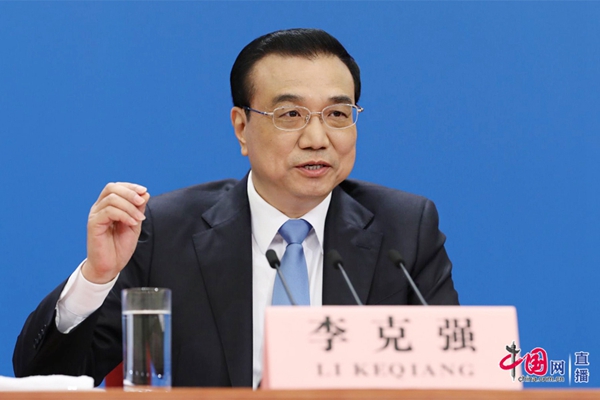Li Keqiang gives new impetus to the Belt & Road project
- By Tim Collard
 0 Comment(s)
0 Comment(s) Print
Print E-mail China.org.cn, March 17, 2017
E-mail China.org.cn, March 17, 2017
|
|
|
Chinese Premier Li Keqiang gives a press conference at the Great Hall of the People in Beijing, capital of China, March 15, 2017. [Photo/China.org.cn] |
Among the major schemes regarding China's external economic relations discussed at this year's "two sessions" was the development of China's flagship "Belt and Road" program. This project has already made great strides forward since its inauguration by President Xi Jinping in 2013: The major financial mechanism for its implementation, the Asia Infrastructural Investment Bank (AIIB) was launched in 2016. And, at this year's World Economic Forum in Davos in January, President Xi announced that China would host a Belt and Road forum for international cooperation in Beijing in May, to enable various national representatives to put their heads together and discuss potential joint development projects.
China's former Minister of Commerce Gao Hucheng, at a press conference in February, mentioned the solid progress already made on the Belt and Road initiative, linking it clearly with China's "opening-up" policy and pointing up the joint projects in the areas of rail, road, civil aviation, electricity generation and transmission, and telecommunications which are already under way.
At this month's "two sessions" event, the baton was taken up by Premier Li Keqiang. In his work report, the premier promised to make solid efforts to pursue the Belt and Road Initiative. His report concentrated largely on the need of the outlying Chinese regions to prepare their own infrastructure to take advantage of their positions along the Road and Belt.
For example, in a separate meeting with provincial NPC delegates, Premier Li encouraged delegates from Shaanxi to work on developing high-end equipment manufacturing, information technology, advanced logistics and the extension of e-commerce to rural districts. To this end the provincial government should further streamline administration, delegate power to lower levels, and thereby enhance the province's role as a key junction in the Belt and Road Initiative, combining that with taking a lead in the development of China's western region. This can be seen as part of a general exhortation to the northern and western provinces to raise their game if they would like to reap the benefits of the Belt/Road program for trade links to China's neighbors, and of course also to the coastal provinces to prepare their own economies for access to the Maritime Silk Road concept.
In the wider context, Premier Li committed the country to accelerating the building of international infrastructure, including both overland economic corridors and maritime cooperation hubs, and to negotiating agreements for smoother customs mechanisms between those countries lying along the routes. Deepening cooperation between China and her neighbors on building up industrial capacity will enable China and neighboring countries to draw on each other's strengths and promote the export of Chinese equipment and services. An additional aim mentioned by the premier was the extension of international agreements on technical standards based on Chinese norms.
Premier Li also emphasized that the Belt and Road program will facilitate a projection of Chinese "soft power." He promised that China would strengthen "personal and cultural exchanges and cooperation in education, science and technology, culture, healthcare, and tourism." All these issues would be discussed in detail at the Belt and Road International Cooperation Forum in May.
This meeting should be a major event on the diplomatic calendar. It will display the genuine global reach of the project; not just China's near neighbors in Asia, but Western European leaders too are likely to be invited.
At the moment there are still rivalries between European nations for the chance to participate in the scheme, and these are not just driven by Brexit - although it is likely that U.K. Prime Minister Theresa May will attend to fight the British corner. In February, Italian President Mattarella and French Prime Minister Cazeneuve visited China with proposals for participation in the unrolling of the Belt and Road project to Europe, but they were separate, and potentially rival, proposals.
Whether the EU will be able to rise to the challenge of the possibilities raised by Belt and Road remains to be seen. But all European leaders are driven by the perceived need to achieve quick results linked to the election cycle, whereas China tends to think more of the medium to long term.
However, the geographical mainlines of the Belt and Road program align well with the needs of a United Kingdom which is looking for alternative trading links, while the future of British relations with the EU remains highly uncertain. The Belt and Road links to South Asia and Africa replicate, to a large extent, the old British trade routes established in the imperial period and maintained, as between equal nations, among Commonwealth nations, until Britain joined the EU in 1973 and was compelled to refocus her trading efforts. No doubt it was British perceptions of the potential advantages of linking into the Chinese-led project which lay behind Britain's early accession to the AIIB.
The NPC session proved that it is still "full steam ahead" for the Belt and Road project, and it is to be hoped that the May conference provides added impetus.
Tim Collard is a columnist with China.org.cn. For more information please visit:
http://www.china.org.cn/opinion/timcollard.htm
Opinion articles reflect the views of their authors, not necessarily those of China.org.cn.







Go to Forum >>0 Comment(s)